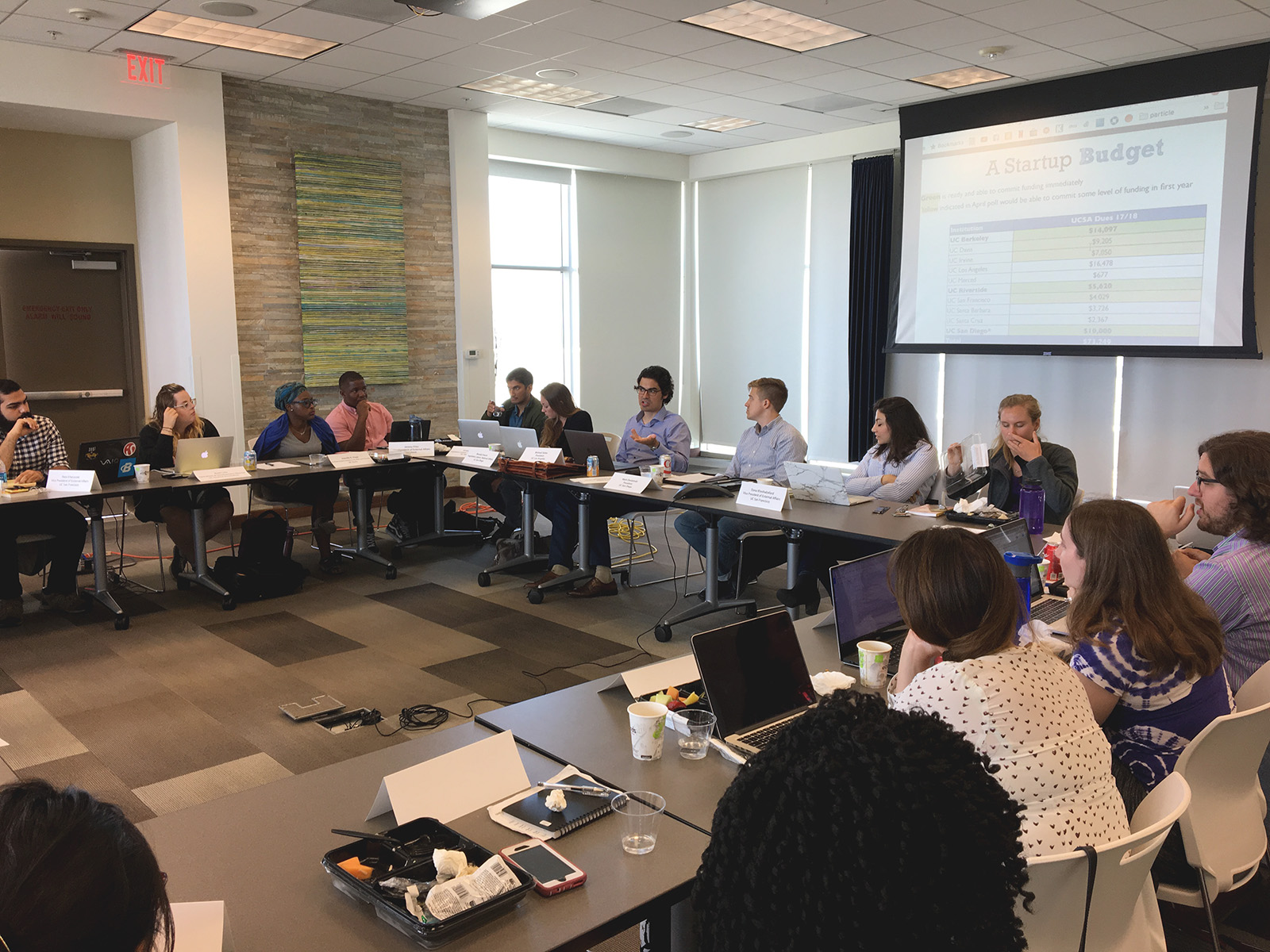UC graduate student leaders form independent advocacy group

University of California campus graduate student associations formed a coalition to represent their specific interests. (Courtesy of Joshua Baum)
By Ryan Leou
Aug. 7, 2017 12:22 a.m.
University of California graduate and professional student leaders created a new group to better advocate for graduate student interests at a meeting last week.
At the UC Graduate and Professional Summit, which lasted from July 28 to July 31, representatives from 10 campus graduate student associations passed a resolution creating the UC Graduate-Professional Coalition.
Becky Grady, interim president of UCGPC, said the coalition aims to help graduate students advocate for issues specific to them, such as graduate housing and professional degree supplemental tuition levels. PDST is an additional fee students in certain professional programs pay. She added the coalition will decide whether or not to remain a part of the UC Student Association after it comes up with a proposal to restructure itself.
UCSA is an advocacy organization that represents about 250,000 undergraduate, graduate and professional students and works with UC administrators and lawmakers at the state and federal level.
Grady said she thinks UCSA’s structure inhibits graduate student participation. For example, because campus graduate student associations have fewer resources, they can usually only send one representative to UCSA board meetings. In addition, concurrent committee meetings prevent them from having input on all decisions, she said.
“If we don’t have enough representation, graduate students’ concerns can get overlooked,” she added.
Grady said she thinks some graduate students want to establish a separate identity from undergraduate students.
“When (student advocates) go to a legislator, (they) think about undergraduates by default,” she said. “Graduate students have many distinct needs and different priorities on shared advocacy goals.”
Michael Skiles, UCLA GSA president and chair of the summit that approved the coalition’s creation, said he thinks graduate students need an organization to focus on their interests.
For example, most graduate students require more spacious affordable housing that might offer the chance to start a family, while undergraduates might prefer sharing space in a dormitory, Skiles said.
He added in the 2016-2017 state budget discussions, undergraduate and graduate student UCSA representatives disagreed on a resolution in support of a provision to provide $9 million to fund 900 more graduate students.
Graduate students voted against the resolution because they felt the provision provided too few resources to support the proposed admission increase, but undergraduate representatives supported it because the proposal would have meant more teaching assistants for undergraduate courses, Skiles said.
Skiles also said that at the July UCSA board meeting, the board voted down a proposal to reorganize UCSA into separate undergraduate and graduate chapters, with undergraduate representatives voting against and graduate representatives voting in favor of the proposal.
“(The vote) considerably frustrated the graduate associations who had been seeking more autonomy,” Skiles said. “It created a sentiment that graduate students can’t count on UCSA itself creating that graduate autonomy.”
Skiles added he thinks the coalition, whether as a separate organization or as an autonomous division under UCSA, would centralize efforts for graduate student advocacy.
“(UCGPC) will have fewer conferences than UCSA, fewer in-person meetings and probably wouldn’t have its own physical office spaces in Oakland or Sacramento,” Skiles said. “It would instead focus on figuring out what message various graduate associations want to put out, working together to have lobby days in Sacramento or meetings with (the UC Office of the President) to carry that message forward.”
Skiles said he thinks that whether the UCGPC stays with UCSA or not, the organization would still have the strength in numbers to ensure graduate student interests are being met.
Though some graduate student leaders want a separate organization, others see the merit in working within UCSA to address concerns.
Parshan Khosravi, vice president of external affairs at UCLA’s GSA, said he thinks if campus GSAs were to split into a separate organization, they would have trouble matching UCSA’s advocacy resources.
Khosravi, also chair of the UCSA ad hoc committee tasked with coming up with a proposal to restructure UCSA, said he thinks some of the issues regarding advocacy for graduate student issues might not necessarily be structural.
“A lot of it might have to do with circumstantial things that could happen to any organization, so there might be nothing to work on,” he added.
Khosravi also said UCSA will vote on the ad hoc committee’s proposal, which is still being discussed, at its September board meeting. If the UCGPC approves the proposal, it will remain a part of UCSA; if it does not, it will form a separate organization, he added.
He added though he will respect whatever decision UCGPC makes, he plans to continue to push for campus GSAs to remain a part of UCSA.
“If we split, we will lose,” Khosravi said. “If everybody comes and says there’s nothing for us in (UCSA) and have to form our own organization, I will side with the group, but I think we’re making a tremendous mistake in trying to drop out of this organization.”


